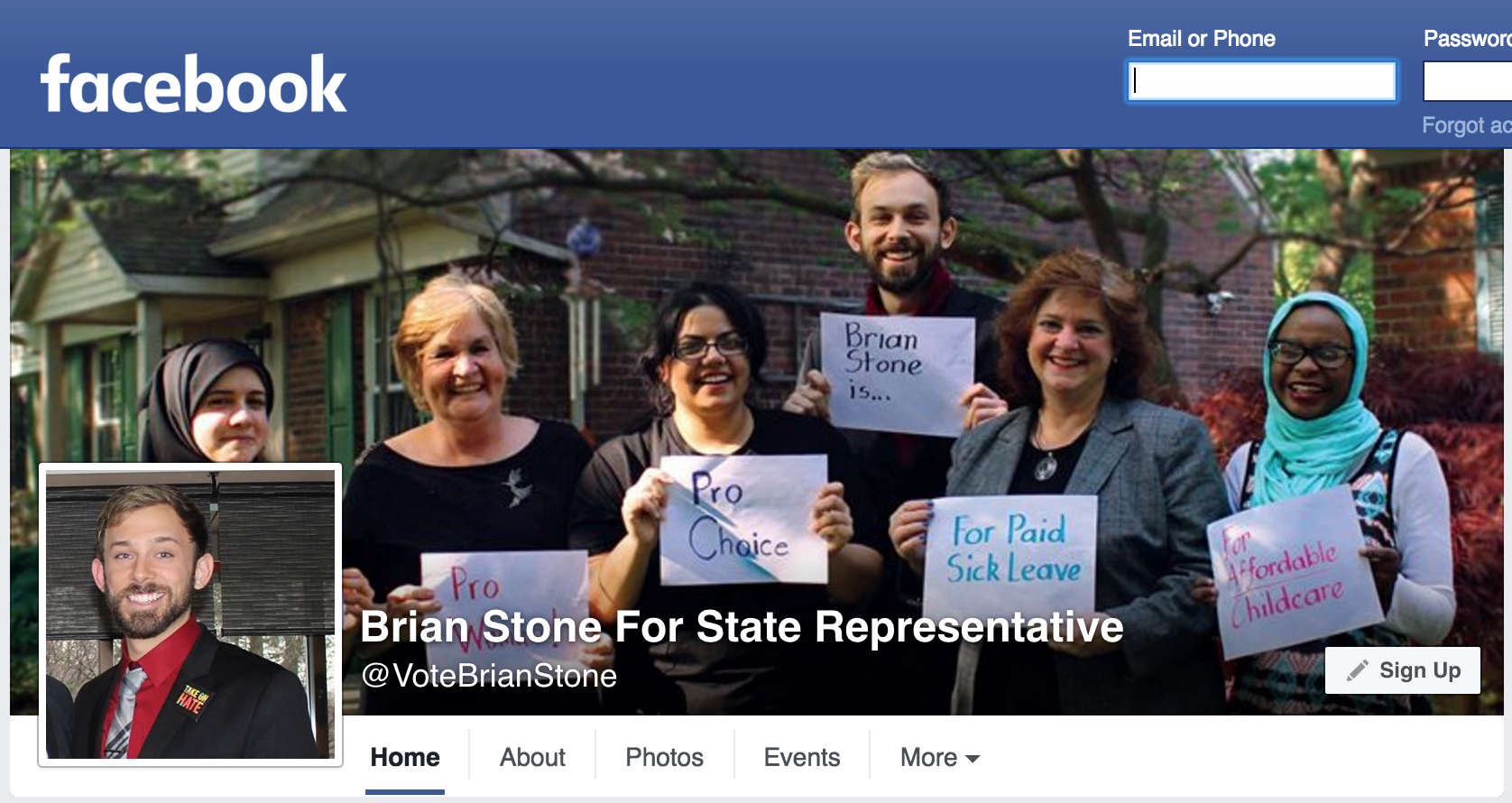Accusations of Corruption in Michigan House Primary
Though attention has been focused on the national primaries, the Democratic primary for Michigan’s 15th State House District demonstrates that local races can be just as heated. With six candidates vying for the party’s nomination, residents were prepared for an intense campaign and a close vote on August 2. On May 18, the race took on a dimension of scandal as candidate Brian Stone accused one of his opponents of illegally lobbying state legislators.
The accusation, posted to Stone’s Facebook accounts, claimed that at an event hosted by the Michigan Insurance Coalition on April 19, one of Stone’s opponents approached state legislators and said that they “were an employee of the insurance company, that they were running for state representative in Dearborn - and in the same sentence, advocate[d] for insurance industry positions that they claim to have written the policy papers for.”
Though Stone did not explicitly name the opponent in the post, the details contained within, such as references to youth and later mention of the candidate being employed by HAP, pointed to Abdullah Hammoud. Hammoud agreed that he was the likely subject, which Stone later confirmed.
Stone elaborated on his claims, describing the event as a “lobby day,” with the actual incident occurring at a reception after the event. It is there that Stone claims Hammoud approached his two sources, a State Representative and a State Senator, who asked what he was doing at the event. Hammoud then allegedly replied that he was there for HAP, and then discussed papers he had written. In this interaction, Stone believes that Hammoud “effectively blurred the lines for himself between his advocacy for the health insurance industry and his status as a State Rep candidate.” Stone was informed of this by the Senator, and then confirmed the story with the Representative via text message.
In support of his claim, Stone points to the Lobby Manual for the Michigan Lobby Registration Act. He believes that Hammoud acted as a lobbyist agent in his conversations with the legislators based on the regulations outlined within the manual. The manual defines a lobbyist agent as “individuals that are paid by lobbyists to influence public officials.” Stone further bases his lobbying claim on Hammoud’s references to papers that he has written regarding Michigan healthcare policy as well as ambiguity regarding his current role with HAP. This ambiguity is something Hammoud does not hesitate to dispel. He described his work with HAP, saying “I measure the impact of healthcare policies on Henry Ford Health systems and Health Alliance Plan. [I also] help us develop our strategy over the next several years for navigating those policies and healthcare trends.”
When it comes to Stone’s allegations against him, Hammoud categorically rejects them at every level. “He has the details all mixed up,” Hammoud says of Stone placing him at a Michigan Insurance Coalition event. According to Hammoud, the event in question was a networking reception hosted by the Michigan Association of Health Plans, an association of all the health plans in Michigan except Blue Cross Blue Shield. He characterizes all his interactions as being friendly, totally unrelated to lobbying, and describes his purpose for attending as “talking to friends and colleagues, and maybe having some hors d'oeuvres.” Hammoud expressed an inability to even guess as to what he could have said that may have been interpreted as lobbying, and said that he is not even aware of HAP’s lobbying agenda.
This point is essential to the question of whether someone is a lobbyist agent according to Michigan law. In order to be required to register, a person must be instructed and paid by a lobbyist to influence public officials. Private individuals are allowed to approach legislators regarding any issue, it is only those who do so on behalf of a lobbyist who compensates them who must register their activity. Stone addressed the murky waters of this concept, explaining “The problem is, if someone has a salary, how do you determine when they were getting paid and when they weren’t getting paid?” According to Hammoud, no part of his job constitutes lobbying.
Hammoud also addressed his campaign’s silence regarding these allegations. “There was no substance to it, there was no truth,” he explained. “[Stone is] really just distracting voters from the issues we haven’t had [conversations about]. Where is the conversation about our roads and infrastructure? Where is the conversation about our air and water with the Flint crisis? Pushing messaging along negative lines, no one benefits from such a conversation.” Hammoud and his campaign are confident in the strength of their message. Having received a number of endorsements, including that of the Arab American Political Action Committee, an endorsement which holds special significance, Hammoud says that he is humbled by the community’s support for his campaign.
Stone takes this issue seriously, however, and has filed a complaint with the State Board of Elections. He did this after having reached out to HAP regarding his allegations, only to receive a form letter from an insurance lobbyist the next day regarding how get their support for his campaign. Stone has no doubt that these two events are connected. His hope is that the Board can issue a decision on this matter, though he expressed a lack of confidence in their willingness to hold individuals accountable. Stone referenced a report released last year by the Center for Public Integrity, which ranked Michigan last in several areas of “vulnerability to corruption,” and gave failing grades in many others. To support his innocence, Hammoud freely discussed the papers he has written that Stone has called into question. Appearing on his LinkedIn page, three such papers are available to the public, and were written while Hammoud worked for the Center for Healthcare Research and Transformation, a nonprofit organization formed in a partnership between the University of Michigan and Blue Cross Blue Shield. The content of these papers varies. One discusses the impact of chronic diseases on healthcare spending and recommends anti-smoking and anti-obesity policies. Another surveys employer health coverage. The final paper surveys consumer satisfaction with Medicaid.
An argument could conceivably be made that discussing the proposals in these papers would potentially fall under lobbying, if not for a provision in the Lobby Manual. Exempt from registering as lobbyist agents are individuals who provide technical information, which the Manual defines as “empirically verifiable data provided by a person recognized as an expert in the subject area to which the information provided is related.” As Hammoud has a Master of Public Health, Epidemiology, and Genetics degree from the University of Michigan, and is the author of the papers, the label of “expert” is not an unreasonable one.
Beyond the allegations of wrongdoing, Hammoud also took issue with the personal attacks levied against him by Stone. In his Facebook post, Stone questions Hammoud’s character by juxtaposing his stated level of student debt with his taste in clothing. Stone presented these points with the justification that corrupt officials rarely dress plainly, but Hammoud characterized them as “distasteful.” “I’m assuming he’s saying that he thinks I dress well, so I’ll take that as a compliment,” was Hammoud’s response when asked if he wished to directly address these comments. He went on to say that he could see no benefit to lying about one’s student loans, and offered his assurance that living with student debt was not pleasant, and presented a real issue.
In Stone’s view, regardless of how the Board ultimately rules, transparency and trust are the key issues. He puts himself forward as an incorruptible candidate and he questions how, with Michigan’s abysmal regulations governing legislator finances, a candidate could be trusted to not act in the interests of their former employers. With Stone pessimistic about the SBE taking the issue seriously, and Hammoud completely denying any impropriety on his part, it appears that the voters may have to judge for themselves which candidate is worthy of their vote.


